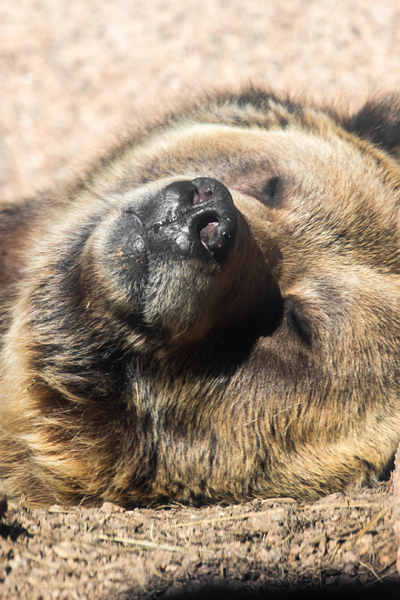
It’s officially winter, when many people wonder if Emmett and Digger, CMZoo’s grizzly bears, go into hibernation. The short answer is no, but it’s a more complicated topic than some might expect. Scientists continue to study seasonal animal dormancy and are finding that animals experience a wide spectrum of behavioral and physiological changes in the winter months.
Various states of dormancy, including torpor or hibernation, are caused by seasonal changes including less sunlight, lower ambient temperatures and reduced food availability in the wild. But, animals in human care can also experience seasonal changes, even though they have plenty of food and shelter available. When animals go into these dormant states, their body temperatures, heart rates, metabolisms and respiratory rates are reduced. Generally, they slow down.
“Although bears have become the poster children of hibernation in popular culture, bear experts maintain that not all bears hibernate,” said Kelsey Walker, Rocky Mountain Wild keeper. “Wild bears naturally slow down to conserve energy, since they don’t have regular access to food. Even with consistent access to food, our boys experience changes each winter, so dormancy could be an adaptation developed over generations of bears surviving in the wild, and it has to do with more than food availability. Like I said, it’s complicated.”
Emmett and Digger sleep more and eat less during the winter months, even though they have access to warm dens and plentiful food year-round. Still, they stay pretty active during the winter, and continue training with their keepers and exploring their multi-yard exhibit and pond.

“In the winter, they will still interact with us, but they expect higher rewards for participation,” said Courtney Rogers, lead keeper in Rocky Mountain Wild. “What seems like a tasty snack during the summer isn’t worth the effort in the winter. I’ve seen Emmett and Digger square up over a single blueberry in the summer. In the winter, we can toss them a whole fresh trout and if it doesn’t land in their mouths, they don’t want it right away.”
Keepers say Emmett and Digger still play-wrestle, splash in their pond, and train in the winter months, but in a less energetic way. To maintain a good relationship while their normal food rewards aren’t as interesting to the grizzles, the keepers give them extra-rewarding items, like salmon.
“We want to make sure they’re still mentally stimulated while their bodies are in a more restful state, so we give the bears opportunities for mental stimulation, through training and enrichment options, while their bodies rest,” said Walker. “If you’ve seen them in the summer, you’ve got to come out and watch them in the winter. Although they slow down a bit, they’re as captivating as ever and guests can see them snuggling together, training with us or investigating enrichment items all winter long.”

